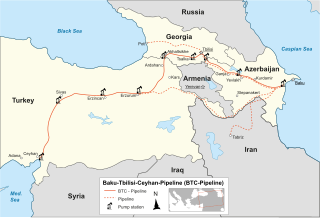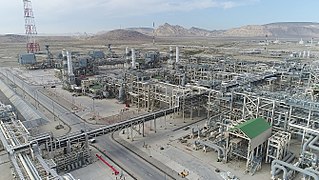Related Research Articles

The Baku–Tbilisi–Ceyhan (BTC) pipeline is a 1,768 kilometres (1,099 mi) long crude oil pipeline from the Azeri–Chirag–Gunashli oil field in the Caspian Sea to the Mediterranean Sea. It connects Baku, the capital of Azerbaijan and Ceyhan, a port on the south-eastern Mediterranean coast of Turkey, via Tbilisi, the capital of Georgia. It is the second-longest oil pipeline in the former Soviet Union, after the Druzhba pipeline. The first oil that was pumped from the Baku end of the pipeline reached Ceyhan on 28 May 2006.

Alfa Group Consortium is Russian international privately owned investment groups, with interests in oil and gas, commercial and investment banking, asset management, insurance, retail trade, telecommunications, water utilities and special situation investments.
Tengiz field is an oil field located in Zhylyoi District, Atyrau Region, northwestern Kazakhstan.

The PJSC LukoilOil Company is a Russian multinational energy corporation headquartered in Moscow, specializing in the business of extraction, production, transport, and sale of petroleum, natural gas, petroleum products, and electricity. It was formed in 1991 when three state-run, western Siberian companies merged. The original companies were named after their respective towns in Khanty–Mansi Autonomous Okrug that each was based in; Langepasneftegaz, Urayneftegaz, and Kogalymneftegaz. Its new name is the combination of the acronym LUK and the English word "oil".
Tengizchevroil is a joint venture between Chevron, ExxonMobil, KazMunayGas and LukArco. The joint venture was formed in April 1993, when the government of Kazakhstan granted exclusive 40-year rights to Tengizchevroil LLP (TCO) to develop the Tengiz and Korolevskoye oil fields located in the north-eastern reaches of the Caspian Sea in Kazakhstan.
Karachaganak Field is a gas condensate field about 23 kilometres (14 mi) east of Aksay (Ақсай) in northwest Kazakhstan. It was once a massive Permian and Carboniferous reef complex covering an area 30 by 15 square kilometres. At its largest point, the reservoir contains a gas column 1,450 metres (4,760 ft) deep with a 200 metres (660 ft) deep oil rim below it. It is estimated to contain 1.2 trillion cubic metres of gas and one billion tonnes of liquid condensate and crude oil. Discovered in 1979, it began production under Karachaganakgazprom, a subsidiary of Gazprom. In 1992, AGIP and British Gas were awarded sole negotiating rights, forming a partnership company. In 1997, Texaco and Lukoil signed a 40-year production sharing agreement with the original two companies and the Kazakhstan government to develop the field for world markets. The agreement was turned under a partnership company known as Karachaganak Petroleum Operating (KPO) where Royal Dutch Shell and ENI are joint operators with a 29.25% stake each in the company, and with Chevron and Lukoil owning 18% and 13.5% respectively. In September 2009 the KPO filed an arbitration case against Kazakhstan. The Republic of Kazakhstan appointed Maksat Idenov to lead the negotiations, after which the arbitration was suspended towards an amicable settlement of the dispute and KazMunayGas engaged in entrance into the project in 2010. Under the terms of an agreement reached on December 14, 2011, the Republic of Kazakhstan has acquired through KazMunayGas a 10% stake for $2 billion cash and $1 billion non-cash consideration.
Kashagan Field is an offshore oil field in Kazakhstan's zone of the Caspian Sea. The field, discovered in 2000, is located in the northern part of the Caspian Sea close to Atyrau and is considered the world's largest discovery in the last 30 years, combined with the Tengiz Field. When discovered, it was the second largest oil field in the world.
TNK-BP was a major vertically integrated Russian oil company headquartered in Moscow. It was Russia's third-largest oil producer and among the ten largest private oil companies in the world. In 2013 it was acquired by Russian oil company Rosneft.

The Burgas–Alexandroupoli pipeline was a proposed oil pipeline project for transportation of Russian and Caspian oil from the Bulgarian Black Sea port of Burgas to the Greek Aegean port of Alexandroupoli. It was seen as an alternative route for Russian oil, bypassing the Bosporus and the Dardanelles. However, in December 2011 the project was suspended by the Bulgarian government due to environmental and supply concerns.

The Caspian Pipeline Consortium (CPC) is a consortium and an oil pipeline that transports Caspian oil from the Tengiz oil field in Kazakhstan to the Novorossiysk-2 Marine Terminal, an export terminal at the Russian Black Sea port of Novorossiysk. It is one of the world's largest pipelines and a major export route for oil from the Kashagan and Karachaganak fields. The CPC pipeline transfers about 1% of global oil supply and handles almost all of Kazakhstan's oil exports. In 2021, the pipeline exported up to 1.3 million barrels per day (bpd) of Kazakhstan's main crude grade, light sour CPC Blend, which represented 80% of Kazakhstan's total oil production of 1.6 million bpd.

Shah Deniz gas field is the largest natural gas field in Azerbaijan. It is situated in the South Caspian Sea, off the coast of Azerbaijan, approximately 70 kilometres (43 mi) southeast of Baku, at a depth of 600 metres (2,000 ft). The field covers approximately 860 square kilometres (330 sq mi). Stretching out over 140 square kilometres, the reservoir is similar in size and shape to Manhattan Island.

The Ünye–Ceyhan pipeline, commonly known with its former name, the Samsun–Ceyhan pipeline, was a planned crude oil pipeline traversing Turkey from the Black Sea to the Mediterranean oil terminal in Ceyhan. The aim of the project was to provide an alternative route for Russian and Kazakhstani oil and to ease the traffic burden in the Bosporus and the Dardanelles. The project was halted in 2010. This was confirmed again in 2013.
Azeri–Chirag–Gunashli or Azeri–Chirag–Deepwater Gunashli is a complex of oil fields in the Caspian Sea, about 120 kilometres (75 mi) off the coast of Azerbaijan. It consists of the Azeri and Chirag oil fields, and the deepwater portion of the Gunashli oil field. An overall estimate of the area of the development is 432.4 square kilometres (167.0 sq mi). It is developed by the Azerbaijan International Operating Company, a consortium of international oil companies, and operated by BP on behalf of the consortium. The ACG fields have estimated recoverable reserves of about 5 to 6 billion barrels of petroleum. Peak oil production of 885,000 barrels per day (140,700 m3/d) was reached in 2010. However by the first quarter of 2024 production had fallen to 339,000 barrels per day (53,900 m3/d), or approximately one-third of peak value, as the development continued terminal decline. As of 2021, ACG oil accounted for 95% of all Azerbaijani oil exports.

The South Caucasus Pipeline is a natural gas pipeline from the Shah Deniz gas field in the Azerbaijan sector of the Caspian Sea to Turkey. It runs parallel to the Baku–Tbilisi–Ceyhan pipeline (oil).
The Trans-Caspian Oil Transport System is a proposed project to transport oil through the Caspian Sea from Kazakhstani Caspian oilfields to Baku in Azerbaijan for the further transportation to the Mediterranean or Black Sea coast. The main options under consideration are an offshore oil pipeline from Kazakhstan to Azerbaijan, and construction of oil terminals and oil tankers fleet. A strong push for the project has been from the partners of the Kashagan oilfield project and in particular Total who has a share in both the field and the BTC pipeline. They have estimated that such a project would cost roughly US$4 billion. The project also faces opposition from Iran and Russia, both alternative avenues for Kazakhstan's oil and gas who would likely object to competing pipelines being built.
Azerbaijan International Operating Company is a consortium formed to implement the terms of the “Agreement on the Joint Development and Production Sharing for the Azeri and Chirag Fields and the Deep Water Portion of the Gunashli Field in the Azerbaijan Sector of the Caspian Sea” signed among SOCAR and international companies.

Sakhalin Energy Investment Company Ltd. is a consortium for developing the Sakhalin-2 oil and gas project with corporate head office in Yuzhno-Sakhalinsk. Roman Dashkov has been the Chief Executive Officer since 2013.
Energy in Kazakhstan describes energy and electricity production, consumption and import in Kazakhstan and the politics of Kazakhstan related to energy.

The Sangachal Terminal is an industrial complex consisting of a natural gas processing plant and oil production plant, located on the coast of the Caspian Sea 45 kilometres (28 mi) south of Baku, Azerbaijan.

Karabagh is an offshore oil and gas field in the Caspian Sea, located 120 km (75 mi) east of Baku, Azerbaijan, in the northern part of Absheron archipelago. A risk service agreement (RSA) for the development of the Karabagh field was signed on 30 May 2018, between SOCAR and Equinor (Statoil). The Karabagh oilfield is located 120 kilometres east of Baku, close to the SOCAR operated Shallow Water Gunashli (SWG) field and the BP operated Azeri Chirag Gunashli (ACG) field.
References
- ↑ ARCO, LUKoil Sign Summary Shareholders Agreement, Detailed Financing Terms for LUKARCO Joint Venture Archived 2011-06-08 at the Wayback Machine
- ↑ Turner, Lorraine (2009-09-11). "BP says Lukoil buys out stake in CPC pipeline JV". Reuters. Archived from the original on December 15, 2009. Retrieved 2009-09-12.
- ↑ ARCO, LUKOIL Formalize Joint Venture Agreement; First Investment is in Caspian Pipeline Consortium; Negotiations Proceed for Tengiz Oil Field Involvement Archived 2007-10-11 at the Wayback Machine
- ↑ LUKARCO Acquires 5% Interest in Tengiz Oil Field from Chevron Archived 2011-06-08 at the Wayback Machine
- ↑ Watters, Kate (October 4, 2022). "Sidestepping the Sanctions on Russia". Inkstick.